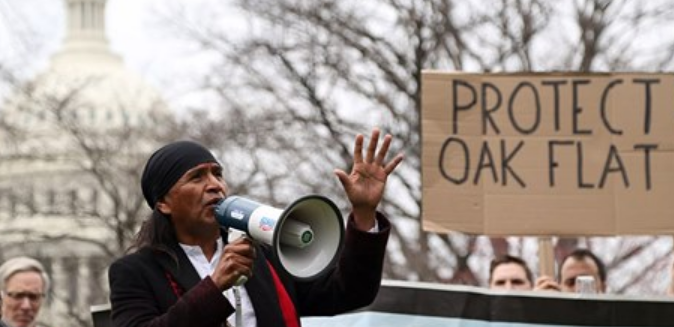
- Details
- By Native News Online Staff
The San Carlos Apache Tribe welcomed a May 9 federal court decision that temporarily halts the U.S. government’s plan to transfer Oak Flat—sacred Western Apache land within the Tonto National Forest—to Resolution Copper, a company backed by Chinese interests.
“This marks a turning point in our two-decade struggle to save Oak Flat from destruction by two of the world’s largest mining corporations,” said San Carlos Apache Chairman Terry Rambler. “We congratulate Apache Stronghold for securing this historic legal victory.”
Apache Stronghold filed an emergency motion to block the transfer while the U.S. Supreme Court considers hearing their case. The case challenges a federal law mandating the land’s transfer to Resolution Copper Mining, LLC once an environmental impact report is issued—a report the federal government was preparing to release after June 16.
The ruling halts the land transfer until the Supreme Court decides whether to review the case.
“There is no close question in this matter,” wrote U.S. District Judge Steven P. Logan. “The balance of equities tips sharply in Plaintiff’s favor, and they have presented serious questions on the merits that warrant the Supreme Court’s careful scrutiny.”
Oak Flat, or Chi’chil Biłdagoteel in Apache, is on the National Register of Historic Places and had been protected for 70 years. Those protections were revoked in 2014 when Congress added a land-swap provision to a must-pass defense bill. Resolution Copper plans to mine the area, ultimately creating a crater two miles wide and over 1,000 feet deep.
“We urge the Supreme Court to accept Apache Stronghold’s petition and affirm our right to practice religious ceremonies that can only be held at Oak Flat,” Chairman Rambler added. “Indigenous peoples around the world are watching and hoping the Court will finally treat Native religious practices with the same respect as other major world religions.”
Resolution Copper is jointly owned by Rio Tinto (UK-based) and BHP (Australia-based), the two largest mining companies globally. Both derive significant revenue from China. The Chinese state-owned firm Chinalco, which focuses on securing strategic minerals like copper, is Rio Tinto’s largest shareholder, holding nearly 15% of its stock.
More Stories Like This
NCAI Passes Two Emergency Resolutions on Immigration Enforcement ActivitiesChickasaw Lighthorse Police Officer named Indian Country Law Enforcement Officer of the Year
Indian Gaming Association Rallies Broad Coalition Against Sports Event Contracts It Calls Illegal Threat to Tribal Sovereignty
Navajo Resources and Development Committee Issues Notice on Livestock Inspection Requirements
American Prairie, Tribal Coalition Files Protest Over Rescinded Grazing Rights
Help us defend tribal sovereignty.
At Native News Online, our mission is rooted in telling the stories that strengthen sovereignty and uplift Indigenous voices — not just at year’s end, but every single day.
Because of your generosity last year, we were able to keep our reporters on the ground in tribal communities, at national gatherings and in the halls of Congress — covering the issues that matter most to Indian Country: sovereignty, culture, education, health and economic opportunity.
That support sustained us through a tough year in 2025. Now, as we look to the year ahead, we need your help right now to ensure warrior journalism remains strong — reporting that defends tribal sovereignty, amplifies Native truth, and holds power accountable.
 The stakes couldn't be higher. Your support keeps Native voices heard, Native stories told and Native sovereignty defended.
The stakes couldn't be higher. Your support keeps Native voices heard, Native stories told and Native sovereignty defended.
Stand with Warrior Journalism today.
Levi Rickert (Potawatomi), Editor & Publisher


